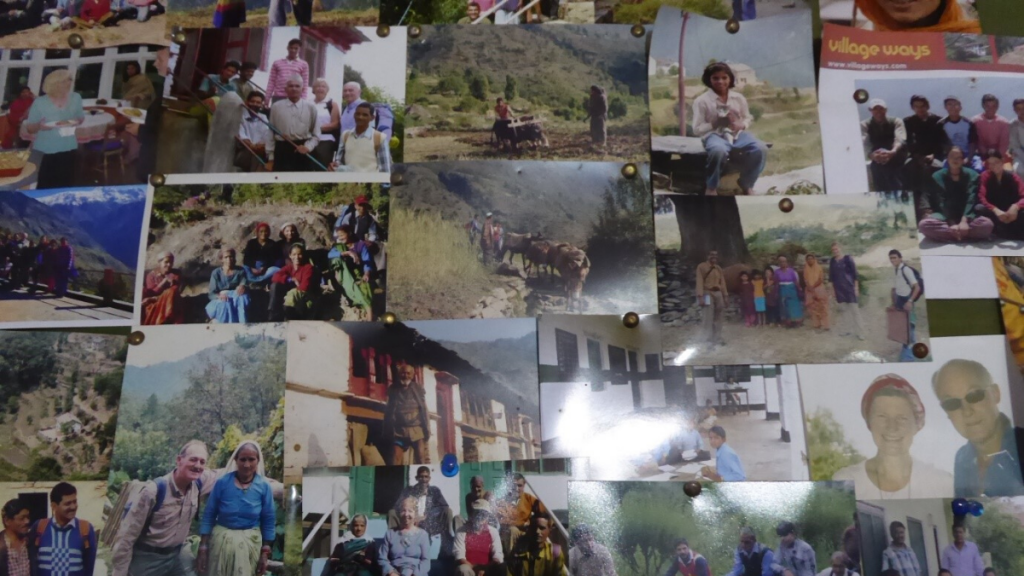I am writing this in Binsar, in the foothills of the Himalaya in Uttarakhand. I was Delhi for the presentation of the India Responsible Tourism Awards, I took the train to the old forestry railhead at Kathgodam and completed the trip to Khali in the Binsar Wildlife Sanctuary once the summer capital of the Chand Kings. Sir Henry Ramsay built the bungalow in Vijay Laxmi Pandit, the sister of Jawahar Lal Nehru, also lived here. Jawaharlal Nehru, Indira Gandhi and Mahatma Gandhi all stayed.
Kali is in a wildlife sanctuary with 200 species of birds, leopards, deer and gray langur. But I am not here to see wildlife. I came to meet men, women – and as ti turned out children – from the five villages which provide the guides and accommodation of the Village Ways programme of walking and talking. This is where the Village Ways idea originated. In a rural area of outstanding natural landscapes suffering from depopulation as young people moved away from the villages to the cities what could be done to reverse the haemorrhaging?
The idea was inspired but simple. Offer people the opportunity to walk through the landscape with guides from the villages(it is their place) at their own pace and to stay in community-owned guesthouses. The guesthouses are owned by the whole community, built of local materials by local people, to a standard sufficient for the guests to enjoy their stay and to appreciate the food and culture of their hosts. Village Ways offers the opportunity to walk and talk with the local communities from a series of villages sharing a common landscape.
The idea is simple and appealing, its realisation anything but simple. I have followed the progress of Village Ways and chaired the Advisory Council which ensures that the principles of the Founders Charter are followed.
The Founders Charter is explicit about its purpose; their’s is a radical form of genuinely community-based tourism delivering for whole communities. Fundamental to Village Ways are the principles that good businesses, to be sustainable, require profitability for all partners and that all Village Ways business units are profitable from the grassroots up. To achieve the potential of the company, financial, marketing and other experts have been and will be brought into the business. So that the founding social purpose – to sustain village life and culture, improve livelihoods in remote rural areas and reduce the need for outward migration.
It was evident at the meeting with people from all five villages in the Village Ways programme in Binsar that these principles are being followed, that tourism is providing additional livelihoods, rather than displacing agriculture, that outward migration has been significantly reduced and that some are returning, and that community cohesion within and between villages is growing.
Village Ways has won three Responsible Tourism Awards, although not in the India Awards this year. The winners in the 2020 India Responsible Tourism Awards and the judges’ reasons can be found online here. In this year’s India Awards there are two “walking and talking” winners. No Footprints based in Mumbai won Gold in the Tour Operator category for enabling visitors to connect with the communities which have made the city what it is over generations, to meet with them, and to hear their stories. The Aga Khan Trust Culture with its partners in Hazrat Nizamuddin Basti urban settlement home to 18,000 people adjacent to the Qutub Minar offers opportunities to walk and talk and engage with Quwwali music, poetry, food and rituals that have defined both the Hindustani culture and Sufism.
Tomorrow I transit Delhi to go south to Cochin and Kerala to spend time walking and talking with Rupesh Kumar and Jose Dominic both recognised in the Judges’ Awards for having made an outstanding contribution to making tourism more responsible.
Take a look at the winners in the 2020 India Responsible Tourism Awards.
